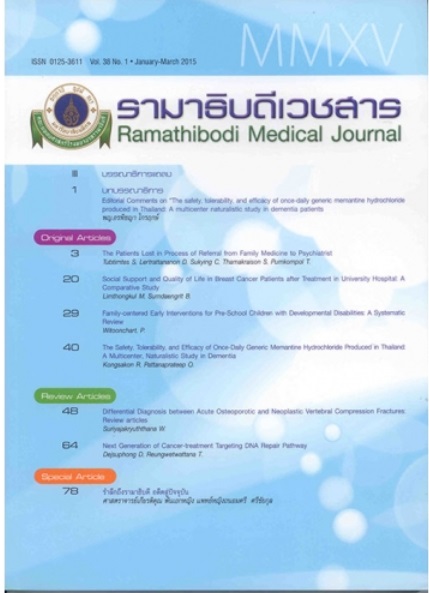Social Support and Quality of Life in Breast Cancer Patients after Treatment in University Hospital: A Comparative Study
Keywords:
Comparative, Social suooort, Qoality of life, Breast Cancer after TreatmentAbstract
Purposes of this descriptive reserach were to study the comparison of social support and quality of life in different factors of breast cancer patients after treatment. Samples included 128 women who visited for follow up in the university hospital during March 2012 - April 2013. The instruments were 1) the personal disease treatment and symptom distress, 2) social support questionnaires developed by Toljamo and Hentinen (2001), and 3) quality of life for breast cancer questionnaires (FACT-B) Thai version 4 developed by Cella et al. (1997). Cronbach's alpha coefficient for social support and quality of life for breast cancer were .88 and .87. Data were analyzed by descriptive, Independent t-test, and Mann Whitney test.
Results found that mean of social support was 50.58 (SD = 8.39) while mean of overall quality of life was 113.49 (SD = 19.18). There were significant different social support separared by illness distress and partner status group at .005. Meanwhile there were significant different between quality of life separated by age group, partner status, financial status, and illness distress at .005. Other factors such as, time after treatment and stage of cancer were not significant different with social support and quality of life in women with breast cancer after treatment. Results from the study could provide evidence to improve social support and quality of life in women with breast cancer after treatment.
References
Attasara P, Buasom R. Hospital-based Cancer Registry -2009 National Cancer Institute, Department of Medical Science, Ministry of Public Health. June 2009.
Mols F, Vingerhoets AJJM, Coebergh JW, van de Poll-Franse LV. Quality of life among long-term breast cancer survivors: A systematic review. Eur J Cancer. 2005;41:2613-9.
Toljamo M, Hentinen M. Adherence to Self-Care and Social Support. J Clin Nurs. 1992;10:618-27.
Leelacharas S, Orathai P. Construct validity of social support questionnaire in Thai women diagnosed with hypertention. J Public Health Nurs. 2011;25:1-17.
Cella DF. Quality of life: concepts and definition. J Pain Symptom Management. 1994;9:186-92.
Pao-in T, Rungwang Y, Teersakul R. Quality of life among the breast cancer patients receiving modified radical mastectomy (MRM) and chemotherapy. Indian J Cancer 2008;45:107-11.
Safaee A, Moghimi-Dehkordi B, Zeighami B, Tabatabaee HR, Pourhoseingholi MA. Predictors of quality of life in breast cancer patients under chemotherapy. Indian J Cancer. 2008;45(3):107-11.
Wonghongkul T, Dechaprom N, Phumivichuvate L, Lasawatkul S. Uncertainty appraisal coping and quality of life in breast cancer survivors. Cancer Nurs. 2006;29(3):250-7.
Sammarco A. Quality of life of breast cancer survivors: a comparative study of age cohorts. Cancer Nurs. 2009;32(5):347-56; quiz 357-8. doi: 10.1097/NCC.0b013e31819e23b7.
Cohen J, Statistical power analysis for the behavioral sciences. 2nd ed. Hillsdale, New Jersey: Lawrence Erlbaum Associates Publishers. 1988.
Downloads
Published
How to Cite
Issue
Section
License
Copyright (c) 2015 By the authors. Licensee RMJ, Faculty of Medicine Ramathibodi Hospital, Mahidol University, Bangkok, Thailand

This work is licensed under a Creative Commons Attribution-NonCommercial-NoDerivatives 4.0 International License.













